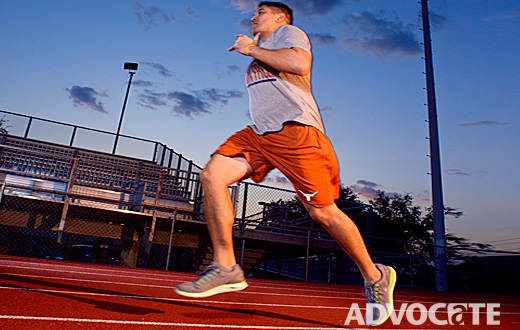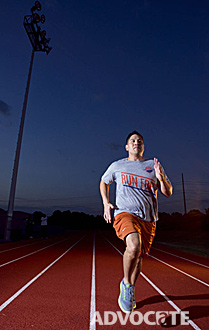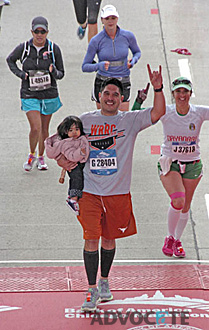A life-threatening illness has nothing on this Lake Highlands dad
A pain in the groin. To an athlete like Paris Sunio of Lake Highlands, it is a minor distraction. Nothing a few stretches won’t fix.
On the morning of July 24, when the pain started, Sunio was several weeks into training for the Chicago Marathon. Following his morning workout, he noticed tightness in the area around his high inner thigh.
The ache, which would rapidly escalate to bullet-wound level pain, was the first sign of an infection that nearly took the 39-year-old’s life.
An excruciating 48 hours of tests, torture and stumped doctors ensued. Narcotics did little to stop the blinding pain that accompanied even the smallest movement. When the 106-degree fever hit, the medical staff began to put the pieces together.
Sunio was infected with Staphylococcus aureus, commonly known as staph infection, a condition that can range from relatively benign to fatal. Sunio’s was life-threatening, doctors told him.
“It went to my pelvic bone region. For it to go to my bones is pretty bad. I got hit really hard by this damn thing,” he says.
A negative attitude is as foreign to Sunio as the infection permeating his bloodstream. His running pals say they never have seen a person so perpetually positive. That even during the hottest, hardest workouts, he is the guy cracking jokes.
“It’s rare you see him down because he always seems to find a silver lining in difficult situations,” says Lake Highlands resident Chris Stratton, who leads Sunio’s running group, the White Rock Running Co-op.
Sunio admits he hit a personal low during his hospital stay.
“I am always the happy, glass-is-half-full type of person, but one night in the hospital I had a moment of depression. The blood thinners make you bruise like crazy, so I was lying in bed alone, in pain and sweating, and I was looking at the deep purple bruising all over my belly from shots and my arms from the IVs and blood draws, and where the PICC was inserted … not knowing when I would go home. I was feeling pretty low.”
The PICC, a peripherally inserted central catheter, is used for easy administration of intravenous antibiotics. It is basically a mobile IV accompanied by a portable antibiotic canister, which must be kept in the patient’s pocket. Survival and recovery would depend on wearing the thing for about two months and administering antibiotics — a meticulous and time-consuming process — daily.
Upon his return home, Sunio could barely lift his 20-pound daughter, Elise, and he couldn’t walk or even stand without assistance. His wife, Grace, says it was tough seeing him this way.
“He went from a super active guy who’s never really sick, to someone who can’t walk or be outdoors. Until this, I had never seen him depressed.”
On a Tuesday evening, a week after his hospital release, members of the running club visited Sunio’s L Streets home. Instantly, he perked up. He regaled them with stories of his freak illness — the jerky paramedics who thought he was an overly dramatic jock with a pulled muscle, his screams that could have broken a window, the shakes, delirium and nightmares, and the cute nurses.
The runners laughed and cringed and told their friend how happy they were to have him home. How there would be other marathons. Don’t even worry about missing out on Chicago, they said.
That’s when he paused. Against his metal walker, he used the good arm — the one that wasn’t gauze wrapped and tube-infused — to straighten himself, and he told them that he still hoped to run the Chicago Marathon on October 7.
The responses varied from gaping silence to nervous laughter to replies of “Sure, buddy,” the sort of dismissive encouragement one might offer a mentally unstable person. Sunio just stood there and smiled, as he always smiles. His cheery outlook was back. His plan brewing.
A few days after the gang visited, he felt good enough to scoot around the house.
“Today was a banner day,” he noted following the visit. “I was able to walk around the house without the walker. Don’t get too excited because Elise just turned 9 months today and she can stand up from a lying position 10 times faster than me. The way I walk is like a pregnant lady waddling, but way slower.”
From there he progressed: walking without the walker, walking at NorthPark Center, pushing Elise’s stroller down the Katy Trail, jogging slowly — IV dangling from his arm — around the Lake Highlands High School track. Once the tube was out, he ran the whole 9-plus miles around White Rock Lake. His peers had mixed feelings about it all.
“I would prefer to see him save this fight for another day. There are lots of races in his future,” Stratton says, “but I commend him for his stubbornness and determination.”
Several of them have kindly, or not so kindly, tried to talk him out of it.
“I know they are just worried I will hurt myself,” he says.
When Grace discusses the prospect of her husband running a marathon, after all the family has endured, it is clear the idea has been keeping her up at night.
“Being in the medical field, I know that a normal body usually can’t handle such a high-demand type of activity right away. It’s just too much too soon. His activity level was almost zero for the past two months, and I’m very concerned and afraid that his muscles, joints, ligaments may not hold up. And most importantly, his heart, lungs, kidneys and thermoregulatory system will
all be so stressed, too,” she says. But, she concedes, he has made up his mind.
“Knowing Paris, his strong desire to finish in Chicago may well put him in the ‘American Journal of Infectious Diseases,’ ” she adds. “He has my support. Elise and I will be waiting at the finish line to give him the biggest, sweatiest hug ever.”
Marathon morning in Chicago is a crisp 41 degrees, the ideal temperature for distance running. Sunio and some 40,000 other entrants make their way to the start. His plan: jog, slowly, the first half of the course, then walk as far as possible.
As he runs, he sends text messages: 9:22 a.m. “7 miles in 1 hr 15 min,” 10:35 a.m. “half way. 2 hr 23 min. so tired. walk now. trying my best,” 12:03 p.m. “mile 19. tired and hurtin.”
It takes him 5 hours and 26 minutes to reach the end, where Grace and Elise are waiting. With the finish line in sight, a sweaty Sunio hugs his wife, then scoops up his daughter and carries her right through the finishing chute. As a volunteer places a medal around his neck, big fat tears roll down Sunio’s smiling face.
“I didn’t think I could do it for a while there,” he says. “I almost quit after mile 14. Everything was a blur. At 20 [miles], I got some second wind and I started running again. It hurt, but having my daughter in my arms that last 100 meters, as I conquered this crazy goal, made it all worth it.”








